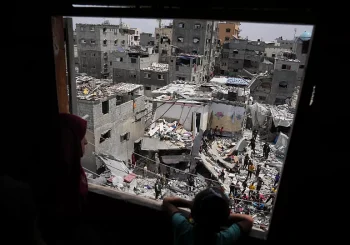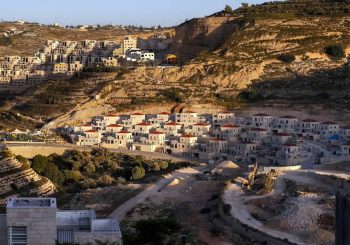Israel will continue its war on Gaza “for many more months,” Israeli military chief Herzi Halevi said. Sources close to the Egyptian and Qatari mediation efforts dismissed the idea reported by the press of a proposal for a post-war Palestinian government of technocrats as “illogical and impractical.”
“The war will go on for many months and we will employ different methods to maintain our achievements for a long time,” Halevi said in a televised statement on the Gaza border on 26 December.
“We will reach Hamas’ leadership too, whether it takes a week or if it takes months” he added.
A source close to the Egyptian and Qatari mediation efforts between Hamas and Israel told Al Ahram that reported plans for a post-war technocratic government were “illogical and impractical.”
The source also emphasized that instead, Egypt is focusing on achieving a comprehensive truce, addressing immediate humanitarian concerns, and exchanging captives.
Anonymous sources speaking to various media outlets had indicated that Egypt is working on a framework to end the war between Israel and Hamas through the release of Israeli captives held by Hamas and Palestinian captives held in Israeli prisons, Israeli withdrawal from Gaza, and the formation of a Palestinian government to rule both Gaza and the West Bank.
The alleged discussions surrounding the establishment of a technocratic government in post-conflict Gaza outlined an interim administration to govern Gaza and the West Bank during a transitional phase, allowing Palestinian factions to reconcile their differences and pave the way for upcoming presidential and parliamentary elections.
However, Hamas and the Palestinian Islamic Jihad insist on a complete ceasefire before negotiations.
“There can be no negotiations without a complete stop to the aggression,” A member of Hamas’ political bureau, Izzat al-Rishq, told Reuters on 25 December.
Meanwhile, the World Health Organization (WHO) delivered aid to Al-Shifa Hospital in northern Gaza and Al-Amal Palestine Red Crescent Society (PRCS) Hospital in the south on 27 December. They delivered fuel and medical supplies to keep essential health services operating.
The Palestine Red Crescent Society (PRCS) also delivered 61 trucks of humanitarian aid on 25 November, the second day of the four-day truce between Israel and Hamas.
However, WHO still faces challenges in delivering supplies to hospitals in Gaza amidst intense hostilities. Hospitals, also serving as shelters for displaced people, witness overcrowding and strained resources. Urgent calls for a ceasefire to facilitate humanitarian aid and prevent further civilian suffering are reiterated.
“Today I repeat my call on the international community to take urgent steps to alleviate the grave peril facing the population of Gaza and jeopardizing the ability of humanitarian workers to help people with terrible injuries, acute hunger, and at severe risk of disease,” WHO Director-General Tedros Adhanom Ghebreyesus said on 27 December.
He also emphasized that “the recent United Nations Security Council resolution appeared to provide hope of an improvement in humanitarian aid distribution within Gaza.”
THE CONFLICT SO FAR
After a surprise attack conducted on 7 October by Hamas on a number of southern Israeli towns which resulted in the deaths of an estimated 1,200 people and more than 220 being taken hostage by Hamas, Israel launched a retaliatory bombing campaign against what it describes as ‘terrorist targets’ in the Gaza Strip.
Over 20,000 Palestinians have been killed in the Gaza Strip — including nearly 8,000 children — and over 53,000 others injured. Meanwhile, at least 259 Palestinians have been killed in the West Bank and at least 3,365 have been injured.
The priority of the Egyptian government since the beginning of the conflict has been de-escalation and the securing of a path for aid to enter the Gaza Strip through the Rafah crossing. Israel bombed the crossing at least six times, and limited aid trucks have crossed to Gaza so far, which UN officials warn is insufficient amid dire humanitarian conditions.
Most Western countries, with the United States at the forefront, have expressed unconditional support for Israel, despite the steadily rising death toll in Gaza. Meanwhile, the United Nations General Assembly has issued a resolution calling for a ceasefire on 8 December, and the Security Council issued a resolution calling for unrestricted aid to Gaza on 18 December.






Comments (3)
[…] السبت 30 ديسمبر.وأكد تصريح رئيس أركان الجيش الإسرائيلي يقيم الحرب في غزة ستستمر “لأشهر عديدة […]
[…] stated at a press conference on Saturday, 30 December. He confirmed the Israeli army chief’s assessment that the war on Gaza will continue for “many more […]